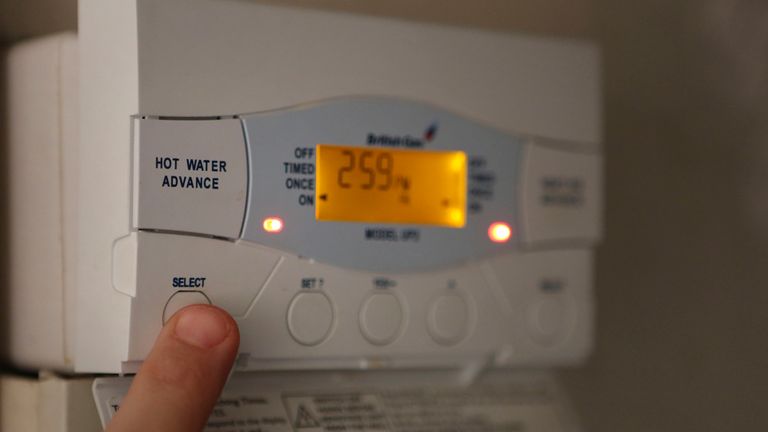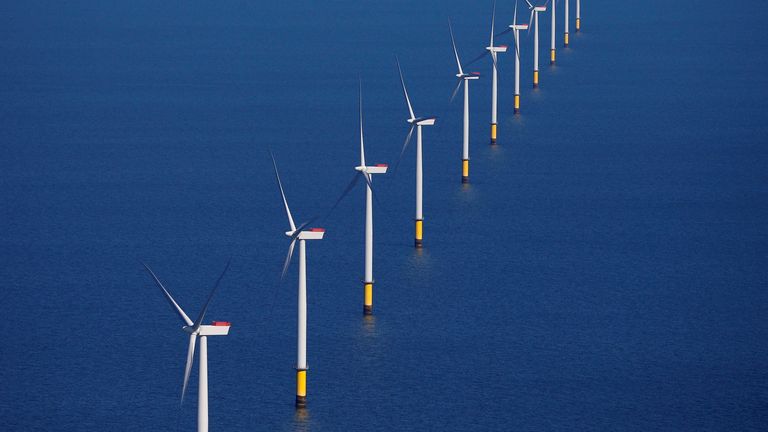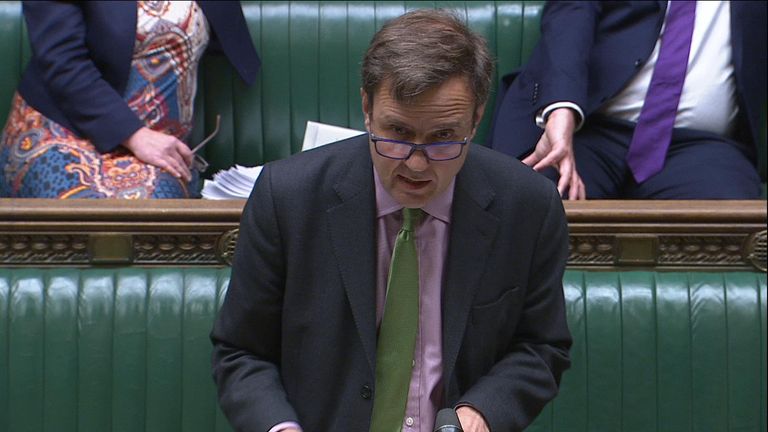The government’s net zero strategy will “support up to 440,000 jobs” by 2030, a business minister has said – as he announced a move towards the end of the sale of new petrol and diesel cars.
The new plan, published on Tuesday, has the intention of dramatically reducing greenhouse gas emissions to reach the government’s aim of net zero by 2050.
It comes less than two weeks before world leaders will meet at the COP26 climate summit in Glasgow to discuss how to reduce the effects of climate change.
Making a statement on the government’s aims in the Commons, Greg Hands told MPs the strategy “is not just an environmental transition, it represents an important economic change too”.
But Greenpeace UK’s head of politics, Rebecca Newsom, described the government’s strategy as “more like a pick and mix than the substantial meal that we need to reach net zero”.
Announcements in the strategy include:
• An aim to fully decarbonise the power system by 2035
• Path towards all heating appliances in homes and workplaces from 2035 being low carbon
• An “ambition” that by 2035 no new gas boilers will be sold
• £450m three-year Boiler Upgrade Scheme to offer households grants for low-carbon heating systems
• £60m Heat Pump Ready programme
• To secure a decision on a large-scale nuclear plant by 2024
• 40GW of offshore wind by 2030
• To deliver 5GW of hydrogen production capacity by 2030 while halving oil and gas emissions
• To end sale of new petrol and diesel cars by 2030 with £620m for zero emission vehicle grants
• £2bn investment to help half of journeys in towns and cities to be cycled or walked by 2030
• £120m to develop small modular nuclear reactors
A review published by the Treasury says “the costs of global inaction significantly outweigh the costs of action” to tackle climate change.
The document, released alongside the government’s net zero strategy, says it is not possible to forecast how individual household finances will be hit over the course of a 30-year transition to net zero greenhouse gas emissions.
Mr Hands told the Commons the strategy will see the UK government fully embracing the “green industrial revolution” and will help the UK “to level up” and “get to the front of the global race to go green”.
“We need to capitalise on this to ensure British industries and workers benefit,” he said.
“I can therefore announce that the strategy will support up to 440,000 jobs across sectors and across all parts of the UK in 2030.
“There’ll be more specialists in low carbon fuels in Northern Ireland and low carbon hydrogen in Sheffield.
“Electric vehicle battery production in the North East of England, engineers in Wales, green finance in London and offshore wind technicians in Scotland.
“This strategy will harness the power of the private sector, giving businesses and industry the certainty they need to invest and grow in the UK to make the UK home to new ambitious projects.
“The policies and spending brought forward in the strategy along with regulations will leverage up to £90 billion of private investment by 2030 levelling up our former industrial heartlands.”
The business minister, who is in charge of the energy brief, told MPs that switching to cleaner sources of energy will reduce Britain’s reliance on fossil fuels and will “bring down costs down the line”.
Mr Hands added that the government “will also introduce a zero emission vehicle mandate that will deliver our 2030 commitment to end the sale of new petrol and diesel cars”.
In strategy documents released on Tuesday, the government says it will invest £620m in grants for electric vehicles and street charging points.
Ministers are also promising an additional £350m to help the automotive supply chain transition to electric.
Vehicle manufacturers will also be made to sell a proportion of clean cars every year, the plans also reveal.
Referring to the government’s strategy as “half-hearted policies”, Greenpeace UK’s Ms Newsom said: “With just eight years left to halve global emissions, the government can’t just keep dining out on its ‘ambitious targets’. Until the policy and funding gaps are closed, Boris Johnson’s plea to other countries to deliver on their promises at the global climate conference next month will be easy to ignore.”
Shadow energy secretary Ed Miliband said the plan “falls short on delivery” and that “there is nothing like the commitment we believe is required”.
He added: “The Chancellor’s fingerprints are all over these documents and not in a good way. So we’ve waited months for the heat and buildings strategy – it is a massive let down.”
Shaun Spiers, executive director at Green Alliance, said “mandating car manufacturers to sell more clean vehicles, supporting the switch to heat pumps and cleaning up our energy grid are essential steps to cutting emissions over the coming decade”.
He added: “But we need a more ambitious response from the chancellor at the spending review to turn these promises into jobs, growth and benefits to consumers – and if the government truly wants to level up the country, we’ll need much more investment once the dust has settled on the COP26 Glasgow climate summit.”
David Wright, chief engineer at National Grid, said the government needs to set out what tackling climate change “means in practice”.
“We’re at a critical stage in the journey where net zero is possible with the technologies and opportunities we have today and, in order to deliver on this, we have to accelerate and ramp up efforts to deploy long-term solutions at scale,” he said.




